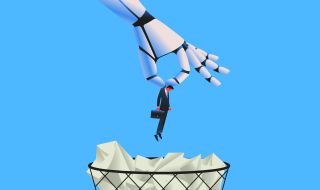Artificial Intelligence
Ask Not What AI Will Do to Humanity
Ask what humanity will do to AI.
Posted July 11, 2023 Reviewed by Monica Vilhauer
Key points
- Recent discussions about AI address its potential harm to humanity.
- A more nuanced discussion about AI’s conceivable impact will likely be more helpful.
- Capitalizing on what distinguishes us from AI may provide the wisdom necessary to optimize our future.

Artificial intelligence and technological advances aim to surpass human limitations by thinking and accomplishing goals in faster and more advanced ways. We hear daily about developments in medicine, agriculture, engineering, and transportation that we believed to be science fiction just decades ago. Our world is evolving faster than at any point in history, and this rate of acceleration is only intensifying.
Yet, AI is suddenly getting a lot of bad press. “Will AI destroy humanity?” is a question I’ve seen posed in various news outlets over the last few weeks.
On one hand, I’m happy to see this topic generating attention. AI is a powerful force seeping its way into every nook and cranny of our lives — as such, it seems prudent that we discuss it. On the other hand, I fear that sensationalist questions such as this will appear fear-based and naïve, dismissing rather than promoting critical dialogue.
Our lives are rapidly changing, and we will better prepare future generations to manage the inevitable challenges that AI and tech will increasingly deliver if we become more educated consumers today. Rather than ignore the profound changes afoot or attempt to categorize them in black-and-white terms as good or bad, let’s engage in a more nuanced dialogue. I suggest that we consider the following:
- One of the silly aspects of doomsday arguments is a tendency to speculate on what experts consider the “distant” future — often, about 100 years. While it’s true that none of us should expect to be alive then, 100 years is literally a drop in the bucket of time. Hominids have been on this planet for hundreds of thousands of years. Up until a few decades ago, change in human socio-cultural lives took thousands of years to evolve. Considering 100 years to be a long time is a simplistic, narcissistic viewpoint that fails to recognize humanity’s rapidly approaching transformation. In mother nature’s terms, 100 years from now is tomorrow. Speculating about it as if we have all the time in the world is naïve.
- Our society is dynamic, in a constant state of flux. So much is happening every moment that we fail to recognize how quickly our lives are evolving. This change is emotionally difficult and stressful for most of us. Even positive life changes, like marriage or a promotion, generate tension. We have AI growing pains now, and we will continue to do so, even if the ultimate achievements are positive — at least until the new rhythms of life feel more routine and predictable. Even if the net result of AI is decidedly beneficial for humanity, the adaptation of new ways of life will require our patience and compassion.
- There is little that we can categorize as all good or all bad. Downsides co-exist with upsides, forming the complexity of life. A baby may be a long-wished for delight, but new parents are more exhausted than they previously believed possible. Your new home is larger and more spacious than your previous home, but now the higher mortgage payments interfere with your travel budget. You are admitted into the college of your choice, but you miss your friends and family terribly. This is life. In this same way, technology will bring with it advantages and disadvantages. We will be wise to neither write off tech as a life-saver nor fear it like the plague. The truth will likely lie somewhere in the middle for most of us.
- Another point to consider is that AI isn’t one entity, or even a single variable impacting multiple segments of life. AI is likely to simultaneously influences all aspects of our lives — from medical care, to intimacy, to how we communicate and what we eat. This means that there are unlimited moving pieces to the technological construction of our future. So many variables are changing concurrently that it is truly impossible to have a grasp on where we are heading. It’s like trying to put a 1000-piece puzzle together with relentlessly shifting game pieces. And since there isn’t a future scenario where the game pieces will stop moving, reality will constantly re-invent itself. We will be wise to avoid assuming we have it all figured out.
Asking Better Questions
It’s tempting to ignore the future, since it’s so uncertain and confusing. Our lives today seem complex enough, it’s not easy to generate the emotional bandwidth to grapple with the unknown. However, future humans depend on our willingness to actively wrestle with these topics.
Let’s thoughtfully consider how the more vulnerable among us, such as children, elderly folks, and people with mental health challenges, may be positively and negatively impacted by AI’s increasing presence. What skills and personality styles will enable a smoother transition from the world as we know it to the one being birthed? How can we capitalize now on that which makes us human — our ability to feel, to love and be loved — and thus both differentiate ourselves from the technology we are developing, as well as maintain control of it?
For now, we are only guessing at how future generations will experience life. The optimists among us no doubt expect the best, while the pessimists predict the worst. I’m guessing they both will be right, to at least some extent. Despite this disparity, our dialogue today is critical. We can empower future humans by turning our attention to our humanity today and determine how we want our future to look. Let’s get better at being what AI cannot, our best version of human, so we can fashion the best future for humanity.


